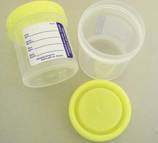Overview
EPIC Code:
- LAB2639
Soft Test Code:
Send Out Test Code:
- 5244
Alternate Names
- Catecholamines, Urine
Included Tests
Creatinine, Dopamine, Epinephrine, Norepinephrine, and Total Catecholamines (calculated)
Clinical Significance
This panel may aid in evaluating catecholamine-producing pheochromocytomas and paragangliomas (PPGLs). However, measurements of plasma free or urinary fractionated metanephrines (ie, the O-methylated catecholamine metabolites) are preferred for the initial biochemical evaluation of PPGLs because of their overall high diagnostic sensitivity [1]. To adjust for the concentration differences in random urine specimens, results are expressed as catecholamine to creatinine ratios.
Most PPGLs secrete catecholamines and can cause catecholamine excess, resulting in hypertension, arrhythmia, and hyperglycemia. Left untreated, PPGLs often lead to life-threatening cardiovascular complications. The estimated prevalence of PPGLs is 0.05% to 0.1% in adults with hypertension and 1.7% in children with hypertension [2]. Recognizing the possibility of a PPGL and performing appropriate biochemical testing are crucial for the diagnosis [1]. Plasma or urine catecholamine levels may be used, in addition to metanephrine levels, to provide additional information during the initial biochemical evaluation of PPGLs (eg, when detecting dopamine-secreting paragangliomas) [2].
Intermittent or insignificant secretion of catecholamines by some PPGLs may not increase catecholamine measurements. Physiological stress and certain medications (eg, acetaminophen, labetalol, and sotalol) may increase catecholamine measurements [1].
The results of this test should be interpreted in the context of pertinent clinical and family history and physical examination findings.
References
1. Lenders JW, et al. J Clin Endocrinol Metab. 2014;99(6):1915-1942.
2. National Comprehensive Cancer Network. NCCN clinical practice guidelines in oncology (NCCN Guidelines®). Neuroendocrine and Adrenal Tumors. V1.2022. Accessed June 28, 2022. http://www.nccn.org
Specimen Collection & Preparation
Patient Preparation
It is preferable for the patient to be off medications for three days prior to collection. However, common antihypertensives (diuretics, ACE inhibitors, calcium channel blockers, alpha and beta blockers) cause minimal or no interference. Patient should avoid alcohol, coffee, tea, tobacco and strenuous exercise prior to collection.
Specimen Requirements:
-OR-
1.0 mL Random Urine in a Yellow Capped Plastic Container with 6N HCI
Minimum Volume:
0.7 mL Urine ** This volume does not allow for repeat testing
Specimen Information:

Collection Instructions:
Specify on the request form and on the urine container random urine volume and time of collection
Processing Instructions:
After urine collection, add 0.5-1.0g/L of 6N HCL to maintain PH below 3.
Urine with preservative should maintain a pH below 3.
Rejection Criteria:
pH >3.0 and received unfrozen
Unpreserved ambient urine
Transport and Storage:
-
Ambient (18-24°C):
7 Days
-
Refrigerated (2-8°C):
7 Days
-
Frozen (-20° C or colder):
28 Days
pH >3.0 and received unfrozen
Unpreserved ambient urine
Clinical Interpretation
Reference Range:
Epinephrine
Pediatric: Not Established
Adult: 2 - 16 mcg/g creat
Norepinephrine
Pediatric: Not Established
Adult: 7 - 65 mcg/g creat
Calculated Total
Pediatric: Not Established
Adult: 9 - 74 mcg/g creat
Dopamine
Pediatric: Not Established
Adult: 40 - 390 mcg/g creat
Methodology:
- Liquid Chromatography / Mass Spectrometry (LC/MS)
Clinical Significance
This panel may aid in evaluating catecholamine-producing pheochromocytomas and paragangliomas (PPGLs). However, measurements of plasma free or urinary fractionated metanephrines (ie, the O-methylated catecholamine metabolites) are preferred for the initial biochemical evaluation of PPGLs because of their overall high diagnostic sensitivity [1]. To adjust for the concentration differences in random urine specimens, results are expressed as catecholamine to creatinine ratios.
Most PPGLs secrete catecholamines and can cause catecholamine excess, resulting in hypertension, arrhythmia, and hyperglycemia. Left untreated, PPGLs often lead to life-threatening cardiovascular complications. The estimated prevalence of PPGLs is 0.05% to 0.1% in adults with hypertension and 1.7% in children with hypertension [2]. Recognizing the possibility of a PPGL and performing appropriate biochemical testing are crucial for the diagnosis [1]. Plasma or urine catecholamine levels may be used, in addition to metanephrine levels, to provide additional information during the initial biochemical evaluation of PPGLs (eg, when detecting dopamine-secreting paragangliomas) [2].
Intermittent or insignificant secretion of catecholamines by some PPGLs may not increase catecholamine measurements. Physiological stress and certain medications (eg, acetaminophen, labetalol, and sotalol) may increase catecholamine measurements [1].
The results of this test should be interpreted in the context of pertinent clinical and family history and physical examination findings.
References
1. Lenders JW, et al. J Clin Endocrinol Metab. 2014;99(6):1915-1942.
2. National Comprehensive Cancer Network. NCCN clinical practice guidelines in oncology (NCCN Guidelines®). Neuroendocrine and Adrenal Tumors. V1.2022. Accessed June 28, 2022. http://www.nccn.org
Documentation
Limitations: Recent surgery, traumatic injury, upright posture, cold, anxiety, pain, clonidine withdrawal, and concurrent acute or chronic illness may produce elevated results.
Production Schedule
Sites Performed
- Quest - Chantilly
Days Performed
Departments
- Sendouts - Miscellaneous
Turn Around Time
2 days
Coding & Compliance
CDM
00913333
CPT Coding
82384, 82570